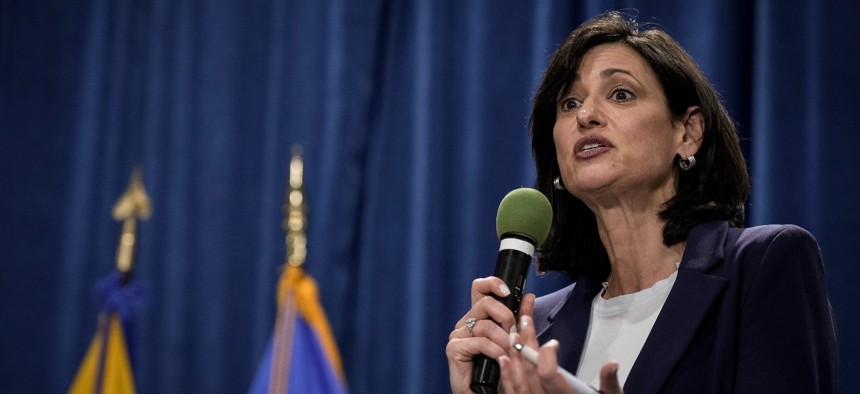
CDC Director Dr. Rochelle Walensky will be stepping down at the end of June. Drew Angerer/Getty Images
The CDC Director is Leaving, the Pandemic is Ending and It's High Time for Reforms, Experts Say
This position will be one of several public health openings that need to be filled.
With the Centers for Disease Control and Prevention director resigning at the end of June as the federal government winds down the COVID-19 pandemic response, it’s the perfect time for the agency to double down on much-needed internal reforms, experts say.
Dr. Rochelle Walensky, who announced her resignation Friday, garnered some criticism for how the CDC handled the pandemic under the Biden administration. She acknowledged the agency’s missteps last summer and launched a series of changes to improve the CDC’s communications and operations, while also noting that Congress must initiate some reforms. “As the summer of 2023 approaches, the agency needs to show how it has put promised reforms into place,” wrote Tom Inglesby, director of the Johns Hopkins Center for Health Security, and J. Stephen Morrison, a senior vice president at the Center for Strategic and International Studies and director of its Global Health Policy Center, in an opinion piece for The New York Times published on Sunday. “This will now fall to Dr. Walensky’s successor and will be key for persuading leaders in Washington to consider making the changes that the C.D.C. is seeking more broadly.”
Echoing a CSIS report earlier this year that concluded the CDC needs a major “reset,” Inglesby and Morrison wrote that the CDC needs more authority to collect data from states and it has a “byzantine” budget process that needs more flexibility: both of which are things that Walensky has asked Congress to change. The earlier CSIS report had also called for the CDC to have more of a presence in Washington, D.C. and more hiring flexibilities for times of crisis, among other things.
Walensky’s departure will come after the states of emergency due to COVID-19 are over. The public health emergency is scheduled to end on May 11, the national emergency ended last month and the World Health Organization declared on Friday an end to the COVID global health emergency.
Inglesby and Morrison, who recognized Walensky’s push for reform, called on the administration and Congress to take advantage of this moment. This “historic opportunity for change cannot be squandered,” they said, “and Congress must take action to improve the CDC’s performance and rebuild trust.”
Morrison told Government Executive on Monday that Walensky and the CDC have been up against the “highly polarized environment in Congress,” citing a recent letter from Republicans on the House Energy and Commerce Committee asking for information by May 19 on reform initiatives at the agency. The Republicans said they needed the additional information before they could consider requests for more authority, and also criticized CDC officials for a lack of transparency.
The CDC said in a press release that Walensky’s initiative to strengthen the agency’s communications and response operations was “designed to orient CDC toward public health action, foster accountability and improve the timeliness and clarity of scientific communications.”
Moreover, “changes are under way on everything from expanding the number of staff who are ready to respond to a disease outbreak to the implementation of plain language training to the overhaul of CDC’s website, so that it’s easier for people to find the public health information they need,” said the agency. “Additionally, a successful reorganization expanded and strengthened the leadership team within CDC’s Immediate Office of the Director and eliminated bureaucracy.”
Health Agency Leadership Vacancies
Biden will be able to appoint Walensky’s successor, but starting in 2025, the CDC director will be subject to Senate confirmation as a result of the fiscal 2023 government appropriations package.
In addition to the pending CDC vacancy, the National Institutes for Health and National Institute of Allergy and Infectious Diseases also don't have permanent leadership, but the president plans to nominate Monica Bertagnolli, director of the National Cancer Institute, for the NIH job, according to The Wall Street Journal.
Additionally, the White House COVID response coordinator is reportedly preparing to resign after the COVID team is disbanded and the White House reportedly can't find someone to lead the new Office of Pandemic Preparedness and Response.
Jennifer Nuzzo, director of the pandemic center at Brown University’s School of Public Health, said she has concerns that Walensky’s departure will either slow or pause the reforms underway at the CDC ahead of the next public health emergency. She tweeted on Friday: “If the administration is having a hard time recruiting for director of [the White House] pandemic office, it suggests a tough road for finding a new CDC director.”
Rebecca Katz, professor and director of the Center for Global Health Science and Security at Georgetown University, said she has confidence that the administration will quickly select candidates for the open roles as there are “certainly plenty of qualified candidates,” and has faith in those serving in acting capacities.
“We’re in a more difficult period right now” due to fading political interest in COVID-19 and a polarized political environment, which could impact the speed at which these positions are filled, CSIS’ Morrison said. “But I have not by any means given up hope that we won’t see some very promising people begin to fill these positions.”







